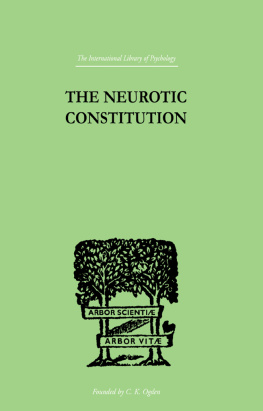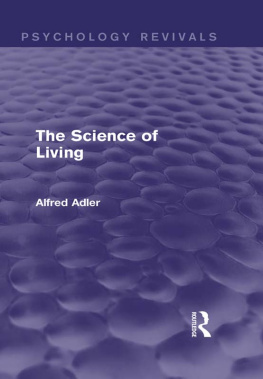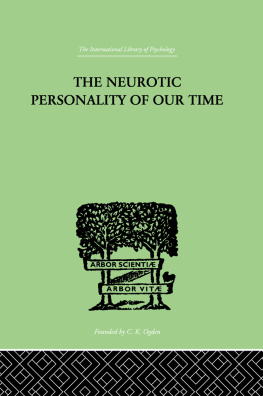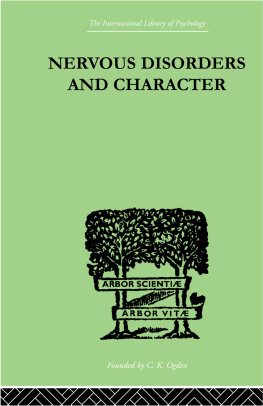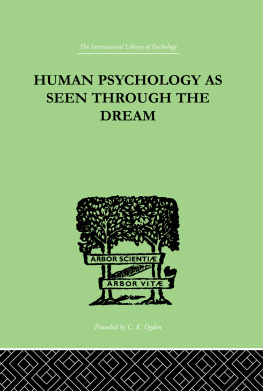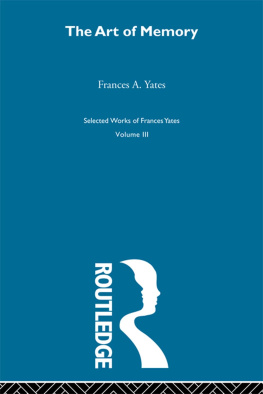
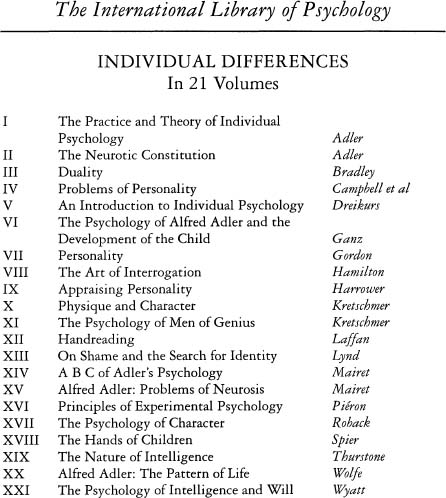

First published in 1921 by
Kegan Paul, Trench, Trubner & Co., Ltd.
Reprinted in 1999, 2001 by
Routledge
2 Park Square, Milton Park, Abingdon, Oxon, OX 14 4RN
Transferred to Digital Printing 2006
Routledge is an imprint of the Taylor & Francis Group
1921 Alfred Adler, Translated by Bernard Glueck and John E Lind
All rights reserved. No part of this book may be reprinted or reproduced or utilized in any form or by any electronic, mechanical, or other means, now known or hereafter invented, including photocopying and recording, or in any information storage or retrieval system, without permission in writing from the publishers.
The publishers have made every effort to contact authors/copyright holders of the works reprinted in the International Library of Psychology. This has not been possible in every case, however, and we would welcome correspondence from those individuals/companies we have been unable to trace.
These reprints are taken from original copies of each book. In many cases the condition of these originals is not perfect. The publisher has gone to great lengths to ensure the quality of these reprints, but wishes to point out that certain characteristics of the original copies will, of necessity, be apparent in reprints thereof.
British Library Cataloguing in Publication Data
A CIP catalogue record for this book
is available from the British Library
The Neurotic Constitution
ISBN 978-0415-21052-2
ISBN 978-1-1363-3044-5 (ePub)
Individual Differences: 21 Volumes
ISBN 0415-21130-1
The International Library of Psychology: 204 Volumes
ISBN 0415-19132-7
Printed and bound by CPI Antony Rowe, Eastbourne
After I had made the attempt to investigate in the Studie tiber Mindeywertigkeit von Organen the structure and tectonic of organs in association with their genetic basis, their functional capability and destiny, I proceeded, supporting myself upon already available data as well as upon my own experience, to apply the same method in the study of psychopathology. In the book before us are embraced the most important results of my comparative, individual-psychologic studies of the neuroses.
As was the case in the theory of somatic inferiority, an empiric basis is made use of in comparative individual-psychology for the purpose of establishing a fictive standard of normality in order to enable one to measure and compare with it grades of deviation from it. In both of these scientific endeavors, the comparative method of study reckons with the origin of phenomena, dismisses from consideration the present and seeks to outline from them the future. This method of approach leads us to view the compulsion of evolution and the pathological elaboration*^ the result of a conflict which breaks forth in the organic sphere for the purpose of attaining equipoise, functional capability and adaptation; the same struggle in the psychic sphere is under the command of a fictitious idea of personality whose influence dominates the development of the neurotic character and symptoms. If in the organic sphere, "the individual develops into a unit mass in which all of the individual parts co-operate toward a common goal" (Virchow), if the various abilities and tendencies of the individual tend toward a purposefully directed, unit-personality, then we may look upon every single manifestation of life as if in its past, present and future there are contained traces of a dominating, guiding idea.
In this way it has appeared to the author of this book, that the most minute trait of psychic life is permeated by a purpose-force. Comparative, individualistic psychology sees in every psychic event the impress, so to speak, or symbol of a uniformly directed plan of life which only comes more clearly to light in the neuroses and psychoses.
The result of such an investigation of the neurotic character should furnish proof of the value and utility of our method of comparative, individualistic psychology in the problems of mental life.
THE AUTHOR.
Vienna, 1912.
" Omnia ex opinione suspensa stmt : non ambitio tantum ad lllam respicit et luxuria ei avaricia. Ad opinionem dolemus. Tarn miser est quisque quam credidit."
SENECA, Epist., 78, 13.
The study of the neurotic character is an essential part of neuro-psychology. Like all other psychic phenomena it can only be understood when taken in connection with the entire psychic life. A cursory knowledge of the neuroses suffices to enable one to discover that which is peculiarly characteristic in them and all writers who have studied the problem of nervousness have laid particular stress upon certain peculiar traits of character. The opinion was a general one that the neurotic shows a series of sharply emphasized traits of character which exceed the normal standard. The marked sensitiveness, the irritable debility, the suggestibility, the egotism, the penchant for the fantastic, the estrangement from reality, but also more special traits such as tyranny, malevolence, a self-sacrificing virtue, coquetry, anxiety and absent-mindedness are met with in the majority of case histories and it would be necessary to detail all writers who have thoroughly studied the subject in order to endorse their contributions. Of the more recent ones, Janet, who has carried on the traditions of the famous French school and who has brought to light some very important and ingenious analyses, must be especially mentioned. His emphasis of the neurotic's " sentiment d'incompletude" particularly, is so wholly in harmony with the results offered by me that I am justified in seeing in my work an extension of this most important fundamental fact of the mental life of the neurotic.
No matter where one begins with trie analysis of psychogenic disorders, one and the same phenomenon forces itself upon one's attention after the briefest observation, namely, that the entire picture of the neurosis as well as all its symptoms are influenced by, nay, even wholly provoked by an imaginary fictitious goal. This final purpose has a creative, directive and adjustive power. The potency of this " goal idea" is revealed to us by the trend and evaluation of the pathological phenomena and should one attempt to dispense with this assumption there remains nothing but a confusing mass of impulses, trends, components, debilities and anomalies which has made the obscurity of the neurosis impenetrable to some, while others have undertaken bold exploratory journeys into this field.
Pierre Janet has certainly recognized this relationship as is shown in his classical descriptions of the Hysterical Psyche ; 1894 (transl. by Dr Max Kahane), but he avoided a detailed description. He expressly maintains, "I have until now only described general and simple traits of character which by means of their association and under the influence of definite extraneous circumstances may produce all kinds of curious behavior and conduct" It is entirely out of place here to enter into a detailed discussion of Janet's description for this treatise would then resemble more a moral romance than a clinical study. Having adhered to this attitude even up to his latest contributions on the subject, Janet, notwithstanding his keen insight into the relationship between the psychology of the neuroses and moral philosophy, never entered the road to synthesis.
Next page
